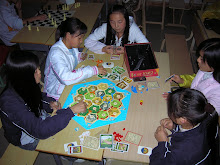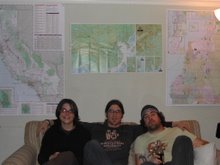In one of my most successful lessons so far, my students got the opportunity to express themselves as they were and as they are.
I broke the class into several groups and gave each group a large piece of paper and markers. On the paper they were asked to represent themselves (some groups represented the typical primary school student, some did middle/high school, and others did college). The assignment was to draw a picture of a person who represented this group and write words to express your life at the time.
The results were eye-opening. Elementary representations included a school uniform and the thoughts that everything was wonderful: many friends and much happiness. The middle/high school representations showed students loaded down by books and included such words as "studying," "homework," and "serious." The college representations included cell phones and cool clothes. Words like "friends," "chatting," and "no money," covered these posters.
One of the students came to me and asked, "How do you say it in English when you say you are poor but you really are not poor." I tried to think and couldn't come up with anything so I just said, "Maybe we would just say 'liar'." Then she noted the poster that said, "no money." She said, "They write 'no money' on their poster, but I know these boys and they have money." It was interesting how this activity became different things for different people. Their poster helped her to practice her Oral English because she was personally interested in this dissonance. The affront became something that would help connect English phrases and words in her brain.
For other students the results were different. One student continually spoke in Chinese, despite repeated warnings. It took the threat of "Kou Fen," or, taking points, to finally convince her that English would be the appropriate means for communication in this Oral English class.
It was an activity that offered many chances to communicate with one another. It was interesting to most students, mostly because it was connected to their own lives. Like all experiences in class I told my students, "It's what you make of this time that will determine how good your Oral English becomes. Those of you who try will improve."
If you have something that would help my students practice their Oral English in a fun or unique way, please let me know. I don't know exactly what that might be, but the first thing that jumps into my mind are puppets!
Cheers!
9.10.2008
Subscribe to:
Post Comments (Atom)








No comments:
Post a Comment